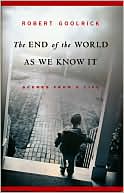

 |

|

The average rating for The End of the World as We Know It: Scenes from a Life based on 2 reviews is 5 stars.
Review # 1 was written on 2008-05-08 00:00:00 Elena L. Bauer Elena L. BauerI heard Mr. Goolrick on my local NPR affiliate and was intrigued by his story. The book is beautifully written, a fine description of the world of the white South. Great details, a boozy, journey through childhood memory. The complaint of other reviewers that this book was too depressive and negative isn't one I share. In fact, I was somewhat refreshed to read a family memoir that doesn't wrap things up in a la-la-la happy fashion at the end. Goolrick is devasted by the events of his past and he doesn't pretend to be healed, "over it" or fixed in any way. I found that truthful and compelling. Many people who experience rape as a child, incest, extreme family dysfunction, and who choose to write about it, are often coming from a place where it's all better now, all figured out and processed and healed. And Mr. Goolrick is clearly still struggling and hurt. I don't think he has to wait until he's all hunky-dory to write his story. |
Review # 2 was written on 2011-04-29 00:00:00 William Harmon William HarmonWhenever I have the possibly perverse desire to be wrong, I only have to use a superlative. Sooner -- perhaps immediately -- or later, I can see that I was wrong. I mention this because of my tendency to think that the last disturbing memoir that I've read is the MOST disturbing of all -- all that preceded it, all that will follow it. Give me a memoir co-starring incompetent, selfish, negligent, and/or abusive parents; and upon finishing it, I'm ready to say: "Off with their heads -- but only after they've endured the most horrible torture imaginable." (Granted, I get a little carried away with envisioning retribution.) I read Angela's Ashes , and I wrapped Frank McCourt's father in the Worst Father banner; I read The Liars' Club , and I wrapped Mary Karr's parents in the Worst Parents banner; I read The Glass Castle , and the banner went from Mary Karr's parents to Jeannette Walls's parents. Wrong. Wrong. Wrong. I just read The End of the World as We Know It ; and Robert Goolrick's parents are, for now, wearing the banner that I had thought others deserved. But I know I'm wrong again. At some point in time, a superlative seems to apply to a person, an achievement, a natural disaster, "a whatever"; then we encounter better than "the best" and, unfortunately, worse than "the worst." There is little in Goolrick's life to be wished for; nevertheless, his writing style is enviable; and to call the arrangement of the "scenes from a life" (the book's subtitle) "brilliant" might be insufficient praise. In other words, his is a life I would hate to have lived; his is a book that I would love to be capable of writing -- excluding the generous allowances that Goolrick sometimes makes for parents who merit few, if any. Still, I understand the resistance to entirely ending the love of the people who made him, however miserable they have made him. Goolrick somehow locates and can embrace "a loveliness to life that does not fade. . . . a tendency toward grace that does not fail us. . ."(206). At the end of this memoir, Goolrick offers various explanations for choosing to write the book. But the last one, which may actually be two, is perhaps the most compelling; in the spacing, I find justification for both possibilities. But I prefer to see the last two sentences [Spoiler? I don't think so.] as linked: I tell it because I try to believe, because I do believe with all my heart, that there is a persistence of song.(213) I TELL IT for all the boys, for the life they never had. (213) There are titles that we can ignore, and there are titles that demand attention. Goolrick's is the latter: The End of the World as We Know It . I won't examine each of the words in it though doing so could add to our understanding of its meanings. The author's use of a first-person plural pronoun implies a connection, not necessarily a specific one, between his experiences and his audience's. And his use of a present-tense verb declares that what has happened to us never stops existing (in this world). There MAY be a tomorrow that is not today, but today is definitely not just today -- today is also the day before it and the day before that one and the day before that one and the day before. . . . |
CAN'T FIND WHAT YOU'RE LOOKING FOR? CLICK HERE!!!